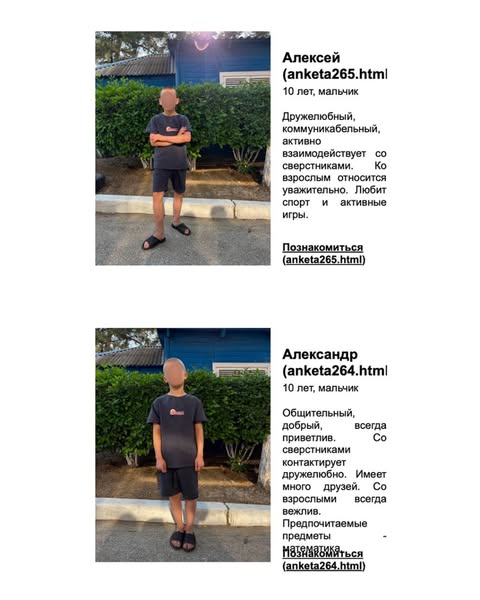Russia forcefully indoctrinates, militarizes and sexually abuses abducted Ukrainian children
Russia has dispersed thousands of Ukrainian children across a sprawling network of facilities inside its territory and in occupied regions of Ukraine, making their recovery and return home a near-impossible task.
According to a new study by Yale University’s Humanitarian Research Lab (HRL), more than 210 sites are being used to indoctrinate, militarize, and house these minors — an unprecedented system of forced relocation and re-education.
The researchers revealed that 156 of these facilities had not been previously identified, while 54 had appeared in earlier reports. The true number is likely higher, as HRL is still investigating additional sites.
More to read:
[video] Former commander of Ukrainian armed forces ridicules NATO’s Article 5
The locations vary widely: cadet academies, military bases, hospitals, churches and monasteries, secondary schools and universities, hotels, family support centers, orphanages, and most commonly — camps and sanatoriums. About half of these institutions are directly controlled by the Russian state.
“Russia is operating a potentially unprecedented system of large-scale re-education, military training, and dormitory facilities capable of holding tens of thousands of children from Ukraine for long periods of time,” the report says.
Inside these facilities, children are subjected to ideological indoctrination designed to instill loyalty to Russia, followed by compulsory militarization programs. These include combat drills, ceremonial parades, war games, assembly of drones and other military equipment, as well as courses in Russian military history.
is handling Ukraine to Russia in exchange for alliance against China
Nathaniel Raymond, executive director of HRL, noted: “The good news is that we now fully understand the scale of the problem we face. The bad news is that resolving it — and bringing these children home — depends on absolute global unity.”
Child trafficking accusations
A Ukrainian NGO has also accused Russia of "state-sponsored child trafficking" after administrators in Russia-controlled areas of Ukraine published an online catalog of what they called Ukrainian orphans (screenshot below).
Mykola Kuleba, head of Save Ukraine, said the database from the Russia-installed administration's Education Ministry in the Luhansk Region contains information about 294 Ukrainian children under the age of 17 who have been separated from their parents.

"Russia isn’t even trying to hide it anymore. It’s openly trafficking Ukrainian children," Kuleba told Free Europe Radio, noting that the website shows the names, photos, descriptions of their personalities and hobbies.
This claim is corroborated by a 2023 Council of Europe report, which expressed concerns from member states’ heads of state and government regarding the “sexual abuse of Ukrainian children.”
Russian strategy
The dispersal strategy makes the challenge of locating and returning the children particularly daunting. Ukrainian officials estimate that more than 19,000 minors have been deported illegally since the full-scale invasion began. By the end of August 2025, only 1,564 had been successfully repatriated. On 15 September, Andriy Yermak, head of President Volodimir Zelensky’s office, announced that Russia had handed over 16 more children.
More to read:
Trump intends to revoke legal status of Ukrainian refugees in U.S.
The forced transfers have drawn international condemnation. In March 2023, the International Criminal Court in The Hague issued arrest warrants for Russian President Vladimir Putin and his children’s rights commissioner Maria Lvova-Belova, charging them with the illegal abduction and deportation of minors from occupied Ukrainian territories.
Earlier this year, the U.S. State Department discontinued funding for the HRL project that tracked these deportations. The Washington Post said this decision may have put at risk an archive of data on some 30,000 affected children.
Ukraine continues to push for international pressure and coordinated efforts to bring its youngest citizens back. But as researchers note, Russia’s deliberate scattering of children across such a vast and opaque system is designed precisely to slow — and perhaps prevent altogether — their return.
More to read:
Zelenski: Give back Ukraine nuclear weapons or grant it NATO membership
As the Kremlin contends with heavy battlefield losses and persistent manpower challenges, some analysts and Ukrainian officials warn there is a plausible — if deeply disturbing — risk that indoctrinated minors could be treated as future expendable resources against their own fatherland.
There’s been no evidence that Moscow is already carrying out such a plan. The Russian authorities have not allowed Ukrainian or international inspections to the facilities where Ukrainian minors are held.







